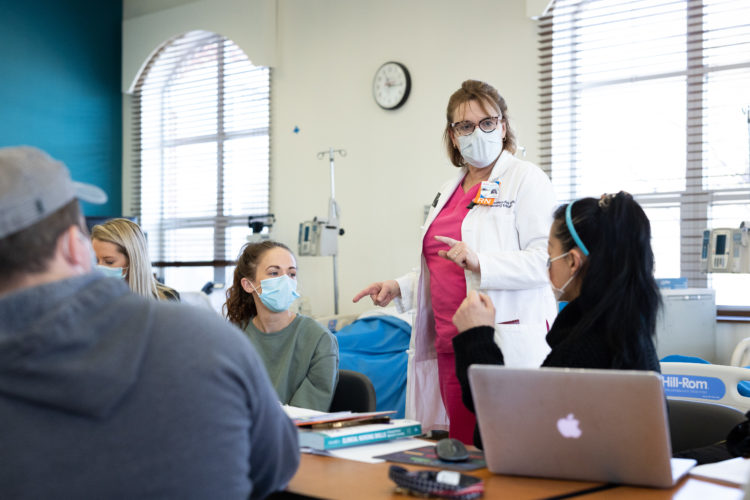Piedmont Virginia Community College added a new cohort of 50 nursing students this year to help alleviate the critical and growing shortage of nurses in the Charlottesville area.
The school moved quickly to make it happen, converting an old computer room into a nursing skills lab, lining up teachers, and then briefly advertising the program just weeks before applications were due.
Still, they were flooded with applications from locals eager to become registered nurses.
But then, the school was quickly confronted with the exact issue it is attempting to solve: They couldn’t find enough nurses to teach the new students.
“It’s a conundrum,” said Nicole Winkler, the dean of Health and Life Sciences at PVCC. “It’s a quagmire. I don’t know how else to describe it.”
PVCC needs trained nurses as faculty who teach students in the classroom. They also need other nurses to take students into local hospitals for on-the-ground training in clinical settings.
When the new cohort began training in January, the school didn’t have enough nurses to cover all the student’s clinical rotations. By February, they’d managed to find enough people to cover the upcoming classes, but they still need more people for upcoming trainings and in case people back out.
“We are in great need of clinical faculty,” Winkler said. “Nurses are being asked to take on extra shifts. There’s only so much they can do. And we, at the school ourselves, we’ve been limping along trying to find full time educators. We’re not fully staffed.”

Linda Peffley-Firer, the associate dean of nursing at PVCC, teaches a skills lab class on Feb. 2. Peffley-Firer has started teaching more classes this winter to make up for a shortage of faculty.
Credit: Mike Kropf/Charlottesville Tomorrow
The issue is not unique to Charlottesville. Across the country, nurses are exiting the profession en masse, burnt out from years of added shifts and high stress from working in a pandemic.
“We know what we’re getting into,” K’Leigh Williams, the Health Unit Coordinator at UVA Health, said with a laugh. She sat with six of her fellow nursing students in a skills lab in early February. Most of her classmates are also already working in health care, just not yet as nurses.
As they worked on their assignment, the students swapped stories of stressful days in their current jobs — scared patients, angry family members and overwhelmed staff. Nurses routinely work well over 40 hours a week, they said. The hospitals are full and busy. And, because of rules limiting hospital visitors, everyone is strained.
During the spike, hospitals were limiting family visitors, which angered friends and relatives and put patients under more stress, the nursing students said. The situation is pushing people out of the profession.
In a recent survey by the American Association of Critical-Care Nurses, 66% of nurses said that they’ve considered leaving nursing because of the pandemic. Meanwhile, 92% said that their careers will undoubtedly be shorter than they’ve planned because “the pandemic has depleted nurses at their hospitals.”
In the last two years, UVA Health has also lost a significant number of its full time nurses, said Kathy Baker, chief nursing officer at UVA Health. Like other hospitals around the country, UVA has made up the numbers by bringing in “traveling nurses” who contract to work for short-term periods when a facility is facing a shortage.
“I understand why people are burning out,” said Darby Whindleton, one of the PVCC nursing students who currently works as a nursing assistant in the intensive care unit at Martha Jefferson Hospital. “I sometimes ask myself, ‘What am I thinking?’”
The table grew quiet for a moment and several students quietly nodded.
“But,” said Whindelton, “as a nurse, you get to be with people and help them through their worst moments. It’s incredible. Those people stay with you. I want to be there to bring a little joy to people in those moments.”











